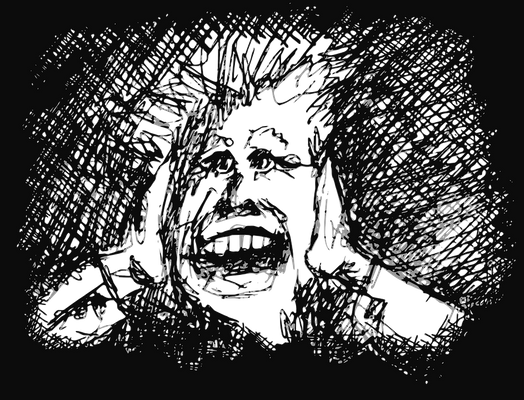2.11.1
Scene Eleven: Summary & Tragedy Ideas
Scene Eleven: Summary
Scene Eleven: Summary
Weeks later, at another poker game at the Kowalski apartment, Stella and her neighbour, Eunice, are packing Blanche's belongings.


Aggression of the men
Aggression of the men
- The men are playing another poker game, but Mitch doesn't seem to be himself.
- The aggression of the game contrasts markedly with the sleeping baby.
- Eunice makes a dig at the behaviour of men.


Blanche's breakdown
Blanche's breakdown
- The audience learns that Blanche has suffered a complete mental breakdown and is going to be committed to a mental hospital.
- Stella covers this by saying that Blanche is going "on vacation".
- Blanche is still dismissive about the cleanliness of the city – an ironic comment given what Mitch and Stanley think of her.


Blanche's monologue
Blanche's monologue
- Blanche’s monologue in the middle of the scene is fantastical and somewhat delirious. The other characters realise what has happened to her, but Blanche herself seems unaware.
- It becomes clear that although Blanche has told Stella about Stanley’s assault, Stella cannot bring herself to believe her sister’s story.


Blanche prepares to go
Blanche prepares to go
- When a doctor and a matron arrive to take Blanche to the hospital, it's clear she was expecting another gentleman (perhaps still Shep Huntleigh?).
- Blanche initially resists them and collapses on the floor in confusion.
- Preparations for her incarceration have to be made (e.g. Blanche’s fingernails have to be trimmed). In this way, her beauty and femininity are compromised.


Stanley and Mitch fight
Stanley and Mitch fight
- Mitch, present at the poker game, breaks down in tears and blames Stanley for his actions. They fight. Mitch observes that none of this would be happening if it was not for Stanley’s interference.
- When the doctor helps Blanche up, she goes willingly with him, saying: “Whoever you are, I have always depended on the kindness of strangers”.


Play's ending
Play's ending
- The play ends with Stanley continuing to comfort Stella, but also fondling with her blouse while the poker game continues.
- Steve says: “This game is seven-card stud.”
- This seems to indicate that despite what has happened, Stella will continue to tolerate Stanley’s "brutal" desire and distrust Blanche.
- It seems Stanley is unlikely to be prosecuted. so he appears to have gotten away with his actions. Steve’s final line seems to re-assert the dominance of men and the patriarchal order.
Scene Eleven: Tragedy Genre
Scene Eleven: Tragedy Genre
Here are some key ideas that relate to the idea of tragedy:


Culmination of the play
Culmination of the play
- This scene is the culmination of the tragedy.
- Clearly, some time has passed and this has allowed Blanche to process the rape and her other experiences. The results are not promising and so she is to be institutionalised.
- This fate seems altogether a modern one - and one which in a way, is worse than death.


Wider tragedy for women
Wider tragedy for women
- The single tragedy of Blanche represents the wider tragedy of women who have been subjected to the patriarchal order.
- At the end of the play, despite several women trying to contest it, the New Order seems again to be male-dominated.


Stella's role in the tragedy
Stella's role in the tragedy
- Stella appears to be complicit in the tragic process, not only organising her sister’s incarceration but either forgiving Stanley or ignoring what he has done.
- She appears, through Eunice’s persuasion, not to believe her sister.


Mitch's suffering
Mitch's suffering
- One of the victims here is Mitch, whose suffering must endure. He appears to have reached an epiphany (or a moment of insight) in realising that Stanley has manipulated both him and Blanche – and that maybe he could have found happiness with her. He looks on in horror as she is carted away.


Presentation of Stanley (ending)
Presentation of Stanley (ending)
- At the end of the play, Stanley retains his hard demeanour and is unapologetic.
- Whilst there might have been hope for him at one stage, his response at the end confirms his position as a tragic villain.
1Context & Overview
1.1The Author
1.2Social Context & Setting
2Scene Summaries
2.3Scene Three
2.5Scene Five
2.6Scene Six
2.7Scene Seven
2.9Scene Nine
2.10Scene Ten
3Character Profiles
3.1Blanche DuBois & Stanley Kowalski
3.2Stella Kowalski & Harold Mitchell (Mitch)
4Key Ideas
4.1Sex & Gender
4.2Appearances, Fantasy & Reality
5Writing Techniques
5.2Genre, Form & Language
6Critical Debates
6.1Early & Modern Reception
6.2Feminist, Psychoanalytic & Marxist Approach
7Ideas About Tragedy
7.1Ideas About Tragedy
8Recap: Main Quotes
8.1Main Quotes by Scene
8.1.1Scene One - Quotations
8.1.2Scene Two - Quotations
8.1.3Scene Three - Quotations
8.1.4Scene Four - Quotations
8.1.5Scene Five - Quotations
8.1.6Scene Six - Quotations
8.1.7Scene Seven - Quotations
8.1.8Scene Eight - Quotations
8.1.9Scene Nine - Quotations
8.1.10Scene Ten - Quotations
8.1.11Scene Eleven - Quotations
Jump to other topics
1Context & Overview
1.1The Author
1.2Social Context & Setting
2Scene Summaries
2.3Scene Three
2.5Scene Five
2.6Scene Six
2.7Scene Seven
2.9Scene Nine
2.10Scene Ten
3Character Profiles
3.1Blanche DuBois & Stanley Kowalski
3.2Stella Kowalski & Harold Mitchell (Mitch)
4Key Ideas
4.1Sex & Gender
4.2Appearances, Fantasy & Reality
5Writing Techniques
5.2Genre, Form & Language
6Critical Debates
6.1Early & Modern Reception
6.2Feminist, Psychoanalytic & Marxist Approach
7Ideas About Tragedy
7.1Ideas About Tragedy
8Recap: Main Quotes
8.1Main Quotes by Scene
8.1.1Scene One - Quotations
8.1.2Scene Two - Quotations
8.1.3Scene Three - Quotations
8.1.4Scene Four - Quotations
8.1.5Scene Five - Quotations
8.1.6Scene Six - Quotations
8.1.7Scene Seven - Quotations
8.1.8Scene Eight - Quotations
8.1.9Scene Nine - Quotations
8.1.10Scene Ten - Quotations
8.1.11Scene Eleven - Quotations
Unlock your full potential with Seneca Premium
Unlimited access to 10,000+ open-ended exam questions
Mini-mock exams based on your study history
Unlock 800+ premium courses & e-books